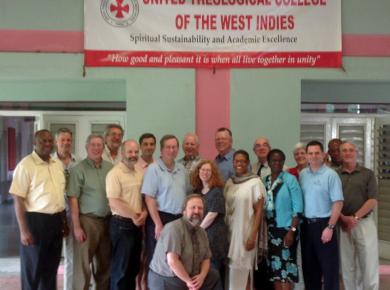Posted: February 10, 2015
Kingston, Jamaica – A consultation held here 08-10 January involved representatives from six different believers baptism church traditions. They shared their understandings and practices of baptism and explored how their thinking has changed in light of the emerging theological convergence on baptism and growing ecumenical encounter over the past 30 years.
This was the first time such a gathering has taken place, and thus represents an historic moment in the life of these traditions.
The traditions included the Baptists, Church of the Brethren, Churches of Christ, Disciples of Christ, Mennonites, and Pentecostals. The 18 participants came from Jamaica, Kenya, Germany, Paraguay, Switzerland, the United Kingdom, and the United States.
Mennonite participants were Fernando Enns of Germany, Alfred Neufeld of Paraguay and Rebecca Osiro of Kenya. Click here for a full list of participants.
The initiative for the consultation grew out of the annual meeting of Secretaries of Christian World Communions in 2012, which noted fresh thinking and official agreements around the mutual recognition of baptism between churches who practice “infant baptism” and those who have practiced “believers baptism.”
The agenda of the consultation included presentations from each of the traditions on their past and current teaching and practice of baptism, with attention to how their understandings have changed or developed. A representative of the Faith and Order Commission of the World Council of Churches was also present to provide input from the wider global discussion on baptism within the ecumenical movement.
The highlights of the consultation, as stated in a report on the meeting, included:
-
gratitude for the opportunity to have an open and honest reflection on the meaning, practice and shared understandings of baptism among the participants;
-
naming the potential found in the image of “being on a journey” for the Christian life, with different forms and expressions of initiation and confession, while sharing a similar call to discipleship;
-
the significance of understanding the Holy Spirit as a source both of our diversity as well as our unity in Christ;
-
the need for a re-examination of the language of sacrament, ordinance, sign and symbol as ways to acknowledge that God is the primary actor in baptism;
-
the need to recognize the continuity between ecumenical reception of other traditions as church, and the practices that mark each tradition as a unique expression of the body of Christ.
The full text of the report on the meeting will be shared with both the Conference of Secretaries of Christian World Communions and the Faith and Order Commission of the WCC with the hope that it will move the discussion and work on the mutual recognition of baptism and Christian unity forward.

Comments: